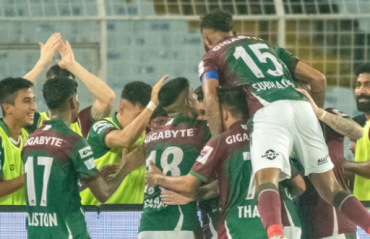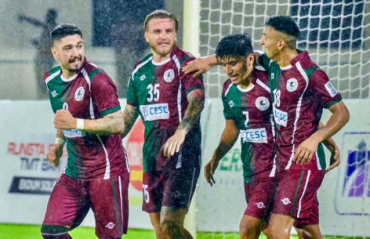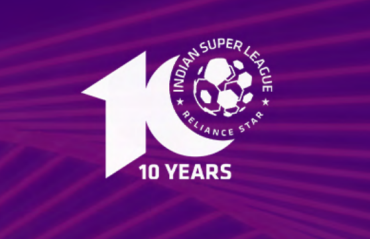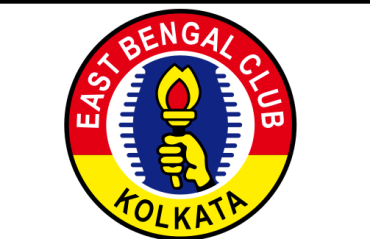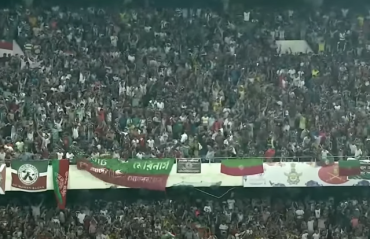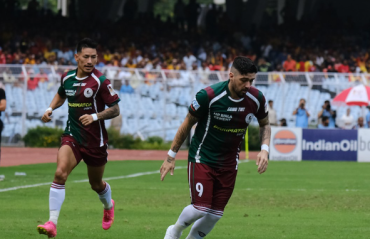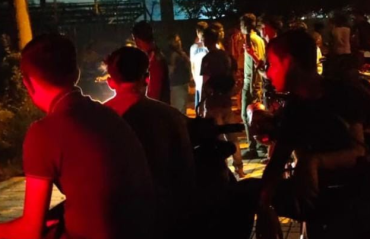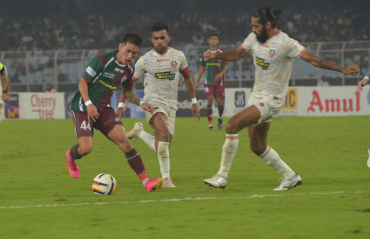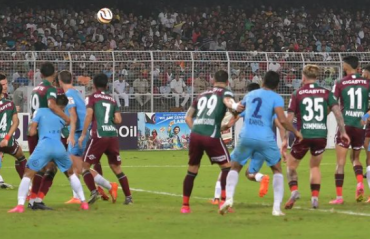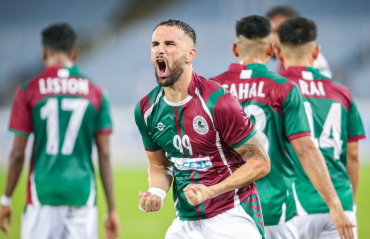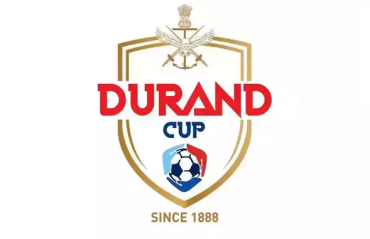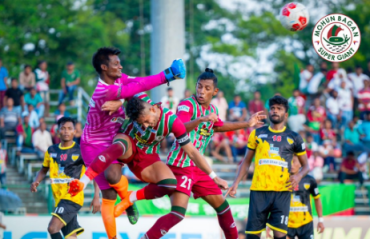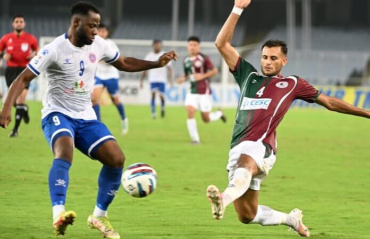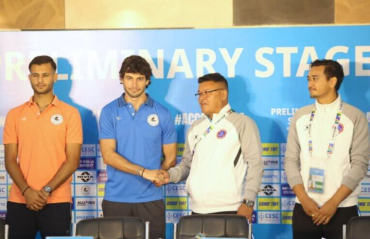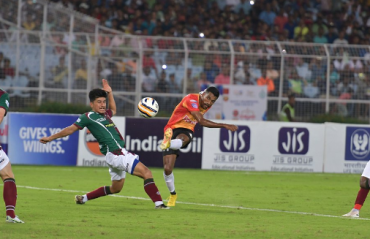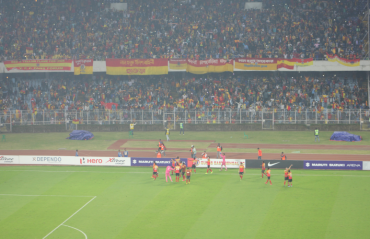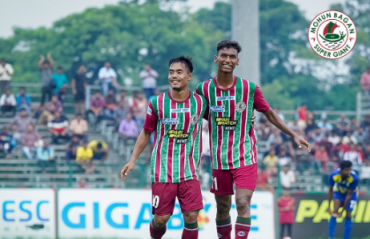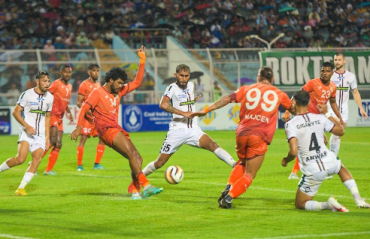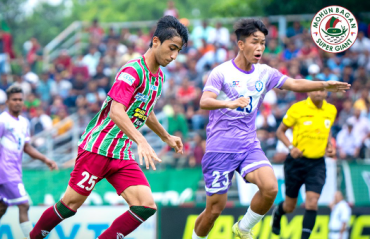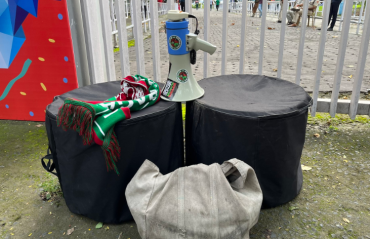SUNBURNT TERRACE - KGSPL, Mohun Bagan and the art of shooting oneself in the foot
- By Chiranjit Ojha

- April 21, 2021

NOVEMBER 2020 WAS A busy month for a core group of Mohun Bagan fans living in the United States and Canada.
These Indian expats, who work in various industries in North America, are a particularly active branch of overseas Mariners. Last year, they turned quite a few heads when they organized an advertisement celebrating the Mohun Bagan Day on the prestigious Nasdaq billboard. The group had gone through the whole vetting process, made presentations, negotiated prices, and achieved a better outcome than many marketing agencies can boast of; and they did it at no personal gain - monetary or otherwise - volunteering their time and skills purely out of love and loyalty for their club.
The billboard, while a head-turner in the media, was seen by them as a mere small side project. Months later, they were already working on their next endeavour; one they were particularly excited about.
They wanted to kick off a tradition of regular screenings of Indian football matches in North America. The Kolkata Derby on 27th November, which marked the first time arch rivals Mohun Bagan and East Bengal faced off under the ISL banner, was the perfect occasion for their first go at something like this. Altough this was started by Mohun Bagan fans, the intention was to encourage fans of all clubs to participate, get inspired and organize their own screenings.
To get it done, they needed to do it at highly visible, recognizable venues that could fit right into the region's regular lifestyle. So they decided to do it in partnership with a restaurant or pub chain. That way they could arrange screenings in multiple cities, and if they proved to be successful, bring Indian football into the radar of the American restaurant & events industries. So they prepared a detailed plan. Venues (Only East Coast cities of USA and Canada made sense since the matches kicked off early morning over there), publicity drives, future expansion possibilities, the Mohun Bagan club's history and culturual significance to the large Bengali expat population living in USA, the craze of the Kolkata Derby, the impact of the ISL in Indian football's popularity... in-depth research into each of these was packed into a presentation. With it, they started approaching the chains best suited for these events.
After over a month of emails, phone calls and a couple of meetings, they made a major headway with one of the biggest restaurant chains in America, with branches in Canada too. The regional head of the chain was interested in the collaboration and could offer to hold screenings in five major East coast cities; four in USA, one in Canada. They negotiated prices, menus and attendee packages. It was all set, and they began to discuss publicity; which would include posters in the area, posts on the restaurant branches' social media accounts, and fliers to be distributed in the local Indian American community and beyond, a lot of whom would be introduced to ISL and Indian football for the first time through this Friday morning breakfast gathering. Fans of other clubs would be invited as well, and at the event they'd get to connect with restaurant staff and discuss holding their own screenings. With this popular restaurant chain being known for its live sports screenings, its branches were always frequented by all sorts of sports fanatics, and they too were likely to happen upon the ISL for the first time when they saw a large gathering of mostly Indian fans watching a live game, cheering, singing and chanting at a very unusual hour.
It was all going great. The group of Mohun Bagan fans was working on the design of the posters and fliers. But then, they ran into an issue they had not seen coming.
In the league package sent out to ESPN+, the broadcaster of ISL in North America, the Mohun Bagan football team (which was using the brand name ATK Mohun Bagan FC) was identified only as 'ATK.' The regional manager of the restaurant chain, who was enthusiastically on board with the idea from the start, had called to ask why he couldn't find Mohun Bagan on the fixture list.
The fans, over multiple conversations, explained the situation: how Mohun Bagan's football department had received a major investment from KGSPL (Kolkata Games & Sports Private Limited) which used to run a franchise called ATK FC, and after acquiring a majority share in the Mohun Bagan football department decided to bring over that brand name and call the team 'ATK Mohun Bagan.' They assured the manager the fixture had an error. The manager said he understood, but since the fliers and social media posts would be put out with the restaurant chain's brand attached to it, it had to use the name that was listed in the ESPN+ fixtures. Restaurants in USA have to abide by special regulations when it comes to showing live sports. The manager was wary of running into any complications regarding that; he didn't want to take any risks that could jeopardize his job in the middle of the pandemic. So the fans were told that any promotional material of the event, be it posters, fliers or social media posts, would have identify their team as just 'ATK.'
Of course, the Mohun Bagan fans refused to agree to that. They scrapped the screening plans and decided to watch the Derby at small gatherings in their homes. They enjoyed the match themselves but lost out on the opportunity to introduce friends, colleagues and acquaintances from five major cities to their club and Indian football. And ISL lost out on a completely organic, fan-arranged multi-city highly visible and widely promoted screening event showcasing their product that was to become a regular thing.
This incident is just one of the ways the presence of the brand 'ATK' in Mohun Bagan's name has benefited ISL and Indian football.
With the fiasco that was the European Super League and the widespread fan backlash it caused, history, tradition and fan culture of a club seem to be the topics in vogue in world football right now. Usually, these are just buzzwords that the corporate elite who run club football utter publicly from time to time, as platitudes to be ticked, without stopping to think twice about what they meant. But when the fans spoke in unison on social media against the cash grab breakaway tournament and hundreds showed up to protest in front of the clubs, major officials started losing their jobs and owners started issuing apologies. The ESL collapsed overnight. The fans, who are frequently looked down upon by this elite class, had showed up to reclaim their club and demonstrate that their patience had a limit.
Today if you turn on Sky Sports News you'll come across multiple expert panelists, journalists and former players talk in detail about how important fan culture is in football and how these clubs' corporate owners have increasingly become detached from that.
Football clubs these days are seen and treated as brands or products by those that control them instead of sporting institutions. Hence, they apply the typical business school logic while governing it, as they would with any property they own; that is to corner the market and maximize profit. The fans, to them, are little more than consumers who are watching for entertainment. It is this central flaw in understanding the football fans that ultimately led to the ESL disaster.
But if the failure of ESL has shown anything it is that ownership of a football club isn't as straightforward as owning a factory, multiplex, shopping mall or some other place of business. The "owners", in this case, are the heads of a community consisting of the players, staff and the fans. While money is important and in most cases the fans accept the commercialization of the institution they love, if as leaders the owners fail to live up to the ideals of the club and the sport, the community will turn against them. And once a large enough portion of the fanbase openly rebels, it's hard for any owner to maintain control of the club in the face of the many protests and disruptions that will come from the fans.
But while the European football establishment, especially in England, have been quick to respond to the fans and immediately reverse course, in India it has played out a bit differently.
Here, too, there has been constant outrage on social media about the way the new investors, namely KGSPL, have treated the Mohun Bagan club, its identity and history. Here, too, there have been protests and demonstrations held by fans. The response, other than some walkbacks of elements that fans objected to, there hasn't been a direct acknowledgement or response from KGSPL. In fact, internally, there's a notion that the protests are running on hype and very soon they will forget all about it, especially if the team wins some trophies. This dismissive attitude towards the fans - very similar in nature to the lack of understanding displayed by the owners of the ESL clubs - is not helping matters. The fans, although deterred by the pandemic and the lack of home games from making regular demonstrations or protests right now, aren't likely to relent until they get their demand - which is to remove the prefix 'ATK' from the Mohun Bagan football team's name - fulfilled, and their loose alliance of fan clubs that do not agree with the investors' controversial actions is growing still.
But it wasn't like this from day one. When the ATK Mohun Bagan logo and jersey colours were announced, they were almost universally praised. They had retained the Mohun Bagan logo and colours, and reflected the Mariners' history and tradition well enough to be embraced even by much of the fans who were skeptical about the new investors.
Although no one agreed with the ATK prefix, no fuss was made about it, as most deemed solidarity with the football team's new management to be the more important thing to express. But that initial goodwill was squandered by KGSPL in what seemed like deliberate attempts to hurt the fans' sentiments by undermining Mohun Bagan's identity.
It began with a sudden cosmetic change in the ISL's jersey schemes. The league, out of the blue, implemented a new rule that required the team to wear three stars on their sleeves along with the phrase '2019-20 defending champions.' This was a reference to ATK FC winning the playoffs in the previous season, implying that this team was a continuation of ATK, not Mohun Bagan.
This branding choice flew in the face of reality. The team was playing professional football using Mohun Bagan's registration, which pretty much establishes beyond doubt that it's a continuation of the Mohun Bagan football team, and that ATK FC's past records do not apply to it. Yet, the ISL and AIFF websites at that time decided to put up club profiles that attributed ATK's records to this team. Even when the ISL 2020-21 fixtures were announced, the phrase "defending champions" was repeatedly used to describe this team. It was clear that this was a well-coordinated branding strategy from the league; one that would have been discussed with representatives of KGSPL beforehand. It seems everyone agreed this was the way to portray this team, despite it having no factual basis.
The strategy was so flimsy that it actually contradicted a different PR narrative floated by KGSPL when they invested in the Mohun Bagan football division. In a press release, they had claimed that this would be a "merger" of ATK FC and Mohun Bagan. Utsav Parekh, a member of the ATK Mohun Bagan board of directors, went as far as saying this in an interview, "In the future we will not say ATK fan or Mohun Bagan fan. We will say ATK Mohun Bagan fan."
Whether or not the principal investor and majority shareholder Dr Sanjiv Goenka agreed with this approach he has never clarified yet. But it's clear that members of the KGSPL upper echelon had consciously decided to float a misleading narrative that directly sought to strip the Mohun Bagan football team from its history, records and hundreds of trophies it has earned over the past 132 years. Although it would have beeen more convincing if they could keep the story straight and decided beforehand whether they'd claim it to be a continuation of ATK FC or a new club.
The three stars on the sleeve and the 'defending champions' tag caused the Mohun Bagan fans to openly express disagreement for the first time. But the flame that started the wildfire was the controversial ad which depicted a Mohun Bagan and an ATK jersey being dipped into a washing machine, and the team's current jersey being pulled out. The blatant disregard for showed in that ad for Mohun Bagan's identity caused an uproar that saw major backlash against the investors on social media and the hashtag #RemoveATK trending.
Finally, the management took notice and took some positive steps. The ad was edited and the branding on the sleeve was removed. The phrase 'defending champions' was also no longer used although a number of ISL commentators kept calling the team 'ATK' for months afterwards until the fans' persistent protests caused Mohun Bagan officials to lodge a complaint with Star.
All this was happening before the season even started. Throughout all this the group of Mohun Bagan fans was still working tirelessly to organize that multi-city ISL screening that they'd pay for themselves. No one was calling for boycotts or anything drastic like that. The fan clubs who were expressing their dissent were still making sure to clarify that they were not against the management or the team, but only took issue with this false narrative being propagated around the team.
But what broke that barrier of patience was when the team came out wearing a third kit - that had not been revealed at the start of the season like the home and away kits were - which had designs that resembled the third kit of ATK FC from the previous season. The fan clubs, which had cooperated and collaborated with the management even through their initial disagreements, now called for a boycott of the matches.
The social media storm began anew. The ATK Mohun Bagan home jersey, which was consistently the number 1 bestseller in its category on Amazon for many weeks, suddenly dropped from the trending list. And on 24th January, they took the protest to the streets. On a Sunday evening (Date and time picked to avoid causing disruption of work) fans held protests in front of the Mohun Bagan club as well as Victoria House, where principal investor Dr Sanjiv Goenka had his office.
Thousands of posters demanding the removal of the ATK prefix were put up across the city of Kolkata.
One Club One Love. #RemoveATK #OnlyMohunBagan @sbotopin @StarFootball @IndSuperLeague @DisneyPlusHS pic.twitter.com/UHjkBTMFJc
— Subhrajit Mukherjee (???????? ???????????) (@sunnym1979) February 7, 2021
The protests continued all the way till 13th February, when the Mohun Bagan Annual General Meeting was held. Here, Mohun Bagan officials Srinjoy Basu and Debashish Dutta, who were also members of the ATK Mohun Bagan board of directors, clarified that the ATK prefix was nothing but a brand added to the football team's name, and the Mohun Bagan team's history and records remained intact. They also announced that the controversial third kit would no longer be used. This was, ultimately, the clarification that calmed down most of the protesters for the time being and the calls to boycott matches stopped.
But still, the demand to remove the ATK prefix, though dormant, is far from gone, and there still seems to be no reconciliation in sight between the management and the fans on this issue.
So, as of now, the net gain from imposing the ATK brand on Mohun Bagan's name and propagating false narratives about the team's identity stands at a multi-city screening in USA and Canada being cancelled, the jersey sale plummeting due to the management's own actions, and a completely avoidable antagonistic relationship with one of the most loyal fanbases in Asia who have remained committed to the club across generations for over a century.
All this begs the question - why? What purpose is being served by repeatedly provoking the fans? Is this being done consciously or by mistake? If it's the latter, how many mistakes have to be made before they realise they're on the wrong path?
The answer here is perhaps the same as the one for the proponents of the European Super League - a lack of understanding of the club and its fan culture by those who are in charge of it.
Before KGSPL invested in Mohun Bagan, they were running the franchise ATK FC. Although it played from the same city as Mohun Bagan, as clubs and in its core identity it couldn't be further from what the Mariners stand for. The ATK management treated ISL as football's version of IPL, and believed they should be the only team from Kolkata playing in it. Representing this city or claiming exclusivity over it is something Mohun Bagan have never done, because they are part of the Maidaan culture which houses hundreds of clubs. Mohun Bagan are a multi-sport institution that's run by its members through votes, very different from ATK's private ownership and top-down operation. And Mohun Bagan have always had a vast fanbase with independent voices, often taking stands against the club officials or even the AIFF or IFA; something ATK FC in its 5 year run did not develop.
So, when KGSPL, who brought over most of the ATK FC personnel to this new venture, faced a disconnect between their ways of doing things and how things work at Mohun Bagan. They treated the Mohun Bagan brand as property that they could re-shape at will, and to some extent they could; as evidenced by the fans' willingness to accept the new brand name and logo at the beginning. But they crossed a line when they tried to do the same with the team's identity.
What they did not understand was how personally connected the fans were to the club. The majority of Mohun Bagan fans were introduced to the club as a child by a loved one. They did not come to the club for entertainment or looking for trophies, they came because it was a family tradition passed down from generation to generation. They take pride in the club's history because in most cases their own personal history is tied to it. So when KGSPL tried to cook up a PR narrative that tried to distance the team from its history, they were telling every fan that the years of support they had given to Mohun Bagan, the memories they have built up over the years and the stories they had heard from their parents, grandparents, uncles and aunties about how they attended Mohun Bagan's matches all those decades ago - all of that is irrelevant, and the deep connection they feel with Mohun Bagan doesn't apply to this team. No wonder this elicited so much anger from the Mohun Bagan fanbase: trying to undermine Mohun Bagan's identity is akin to a personal attack for every fan and their family, and it's true for the other popular clubs in Kolkata as well including East Bengal and Mohammedan Sporting.
Which brings us back to the question - what's KGSPL getting out of this? Loyalty like this is rare in Asian football, is it worth squandering by imposing a brand that brings no value to the table?
Did they take advantage of the fact that the pandemic forced the 2020-21 season to be held behind closed doors to try to sneak in what MBAs like to call a "brand transition"? Did they think a fanbase that has been a part of Indian football 127 years longer than themselves could be conditioned with ads, platitudes and catchphrases to accept a whole new hotchpotch identity, forgetting their club's illustrious history?
In the intial years of ISL, clubs like Mohun Bagan and their fans were often derided as 'legacy club' and 'legacy fans.' The idea was to create an impression that the Mariners, despite being one of the most successful clubs in India at national and continental level over the last decade, are a club that's outdated and only have a past to cling to. Incidentally, the ESL clubs tried to use the same language to gaslight the fans that were protesting against the breakaway tournament. The latter found out pretty quickly that turning against their own fans wasn't a good idea; it remains to be seen how much more emphatic the Mohun Bagan fans have to be to make KGSPL realise the same.
It wouldn't take much for KGSPL to reach out to the Mohun Bagan fans and ask a few simple questions: why do they love this club? Why do they come out on the street in high numbers in the middle of a pandemic for it? Why do they buy this club's merchandise so much that for two years in a row its shirt trended at number 1 on Amazon India? Why do they, living on the other side of the planet, spend their own time and money to organize events that would boost its popularity across the world? What do they gain from it?
The answers, perspectives and stories they will hear from the fans may just turn out to be better than the PR-drafted branding narrative that they tried to propagate.









